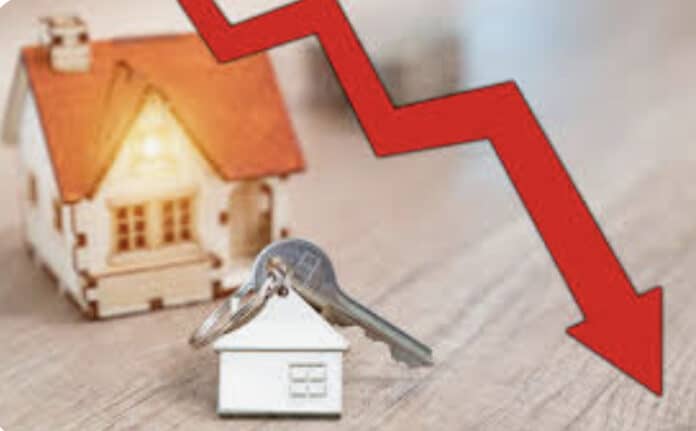According to Nationwide, the number of consecutive monthly falls in UK home prices in December was the longest since 2008.
According to the building society’s monthly poll, all regions of the country saw a substantial slowdown in annual house price increase as the year came to a close, to the lowest rate since mid-2020.
After accounting for seasonal factors, the average price of a house decreased by 0.1% month over month to £262,068 — a far smaller decrease than in the previous two months — leaving prices 2.5% below their August peak.
According to Nationwide, the annual growth rate dropped from 4.4% in November to 2.8% in December. The last low point was 1.5% in July 2020.
All UK regions had a slowdown in the increase in home prices, although south-west England saw the biggest drop, from 12.5% to 4.3% in the most recent quarter, while Wales saw a slowdown from 12.1% to 4.5%. London was the worst-performing English region, with the nation as a whole recording a rate of 4.8%, down from 9.9%, while yearly growth slowed to 4.1% from 6.7% in the third quarter.
The decline in home values is not unexpected, according to Jeremy Leaf, a north London estate agent and a former residential chair of the Royal Institution of Chartered Surveyors. He also noted that borrowing rates had risen significantly. Prices could drop further more as worries about job security grow, and uncertainty will persist until mortgage payments start to become more predictable.
Strong employment, a dearth of inventory, and lender forbearance, which are lowering the danger of mortgage defaults and averting a deeper fall in house prices, are still supporting the housing market, nevertheless.
While some experts anticipate severe drops in home values of up to 12% next year as the housing market continues to cool, Robert Gardner, chief economist at Nationwide, predicts a more moderate reduction in values of approximately 5%.
There are solid reasons to be positive on that front, he said, adding that avoiding forced selling is “the major thing that would help accomplish a relatively smooth landing.” Most experts predict that the unemployment rate would increase significantly in the coming years, approaching 5%, however this would still be low by historic standards. Moreover, household balance sheets remain in good shape.”
While cash purchasers and “seasoned buyers” attempted to complete purchases in December, according to Matthew Thompson, head of sales at the estate brokerage Chestertons, “first-time buyers and second steppers have been more apprehensive and decided to study how the market may evolve in the New Year.” In addition, fewer homes will hit the market in the first quarter of 2023 as a result of the evaluations’ decline from earlier months.
Join us in helping to bring reality and decency back by SUBSCRIBING to our Youtube channel:
https://www.youtube.com/channel/UCQ1Ll1ylCg8U19AhNl-NoTg
and SUPPORTING US where you can: Award Winning Independent Citizen Media Needs Your Help. PLEASE SUPPORT US FOR JUST £2 A MONTH







